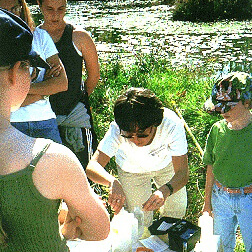
Kimberly B. Bryant ’99 chose Shenandoah because she wanted to study at a school in Virginia that offered environmental degrees with the possibility of internships, as well as research projects wherein part of the curriculum was outdoors. “Shenandoah is a great place for an environmental education – there are excellent professors and Winchester is a wonderful area to study environmental principles,” said Bryant.
Some of Bryant’s fondest memories of Shenandoah are hiking in Shenandoah National Park, camping during a geology field trip, doing environmental research and of course, all of her classes with former Professor of Environmental Studies & Biology Woodward Bousquet, Ph.D. In 1999, Bryant was awarded Environmental Studies Student of the Year and presented at the Virginia Academy of Science. After graduating from Shenandoah, she was accepted to the Vermont Law School and earned a Master of Studies degree in environmental law in 2000.
Bryant is currently the land policy & regulatory coordinator for the Virginia Department of Environmental Quality (DEQ). Her work consists of legal responsibilities related to CERCLA and Brownfields.
Prior to her role with DEQ, Bryant worked for the Virginia Department of Transportation as the assistant district environmental manager in the Hampton, Virginia District. From 2007 – 2008, she work for DEQ as the regional enforcement specialist in the Valley Regional Office.
When talking about accepting her current role at DEQ, Bryant stated, “It was like coming home,” since she had work there previously.
The most rewarding part of Bryant’s job is being able to educate people on the environment and environmental policies.
“Shenandoah was really the beginning of everything for me,” said Bryant. “I learned how to study, how to excel, how to lead. I learned about the environment, ecology, education, policy, how to tackle important issues and to share my understanding of those issues in a way that would connect with people who have varying interests.”
Bryant’s advice to students is: “To volunteer with different types of environmental employers to help figure out what type of environmental employment they’d like after college.”